

Parents should be understanding and supportive of the decisions made by the child during adolescence. Parents can better comprehend the attitudes and behaviours of their child during adolescence through this collection.
Erik Erikson's Stages of Psychosocial Development. Erik Erikson was an ego psychologist who developed one of the most popular and influential theories of development. While his theory was impacted by psychoanalyst Sigmund Freud's work, Erikson's theory centered on psychosocial development rather than psychosexual development. The stages that make up his theory are as follows:1. Erik Erikson's Stages of Psychosocial Development Explained.
In 1623, William Shakespeare wrote, “one man in his time plays many parts, his acts being seven ages,” from screaming infant to the finality of oblivion.
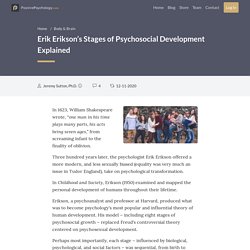
Three hundred years later, the psychologist Erik Erikson offered a more modern, and less sexually biased (equality was very much an issue in Tudor England), take on psychological transformation. In Childhood and Society, Erikson (1950) examined and mapped the personal development of humans throughout their lifetime. Erikson Stages of Psychosocial Development in Plain Language. Eriksons Stages of Psychosocial Development - StatPearls - NCBI Bookshelf.
8 Stages of Development by Erik Erikson. Understanding the Three Stages of Adolescence - HealthPark Pediatrics. While entering the teenage years may be intimidating for both you and your child, understanding the ups and downs of each stage can better prepare you to deal with any challenges.
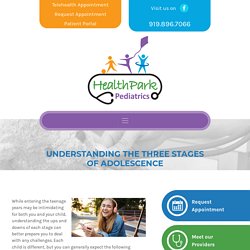
Each child is different, but you can generally expect the following changes during the three stages of adolescence as outlined by the American Academy of Pediatrics. Each stage is separated into lists of both physical and mental/emotional changes. ABC of adolescence: Adolescent development. Early Adolescence. Lynn Blinn PikeHuman Development and Family Studies Extension Look at the cartoon and think about these questions.
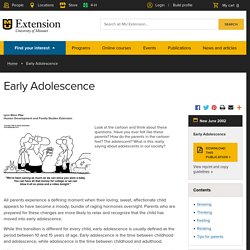
Have you ever felt like these parents? How do the parents in the cartoon feel? The adolescent? Middle to Late Adolescence (ages 15 to 22): The Age of Romance - Child Development Theory: Adolescence (12-24) As a another year or so goes by, when teens are approximately 14-15 years old, they become more interested in developing romantic relationships with partners.
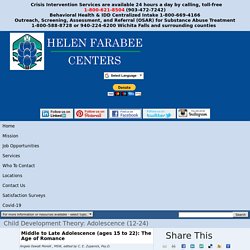
These relationships can be explosive and short-lived, or they can become long-term monogamous relationships. However, guys and girls at this age tend to view romance quite differently. Psychosocial Development. The Search for Identity: Age 12–19. Adolescence is the period of transition between childhood and adulthood.
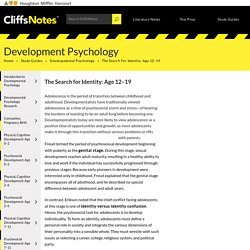
Developmentalists have traditionally viewed adolescence as a time of psychosocial storm and stress—of bearing the burdens of wanting to be an adult long before becoming one. Developmentalists today are more likely to view adolescence as a positive time of opportunities and growth, as most adolescents make it through this transition without serious problems or rifts with parents. Freud termed the period of psychosexual development beginning with puberty as the genital stage. During this stage, sexual development reaches adult maturity, resulting in a healthy ability to love and work if the individual has successfully progressed through previous stages. ADOLESCENCE AND IDENTITY DEVELOPMENT - SoCal Adolescent Wellness. The World Health Organization (WHO) defines an adolescent as any person between the ages 10 and 19, while American psychologists typically narrow it to 12 to 18 years of age.

But under either classification, it is clearly a difficult and challenging time of life, for the adolescent and their parents, relatives and adults around them. According to Amy Bellows, Ph.D., it is a time when teens bodies kick into overdrive. Adolescent Identity Development: What to Expect in Teens. Adolescent Identity Development: The Factors of Change Among the profound and exciting changes taking place in adolescence is the process of self-discovery.
Our teens are working to figure out who they are, making adolescent identity development a central feature of teen life. Young people’s identities are shaped by lots of factors — family, cultural and societal expectations, experiences with institutions like school and the media, and friends. Young people also take active steps and make choices that shape their identity. Family experience in facilitating adolescents during self-identity development in ex-localization in Indonesia. Identity achievement of adolescents living in ex-localization is similar to that of adolescents in general In this study, the families expressed that the identity achievements of their children in terms of changes were similar to the achievements of adolescents in general.
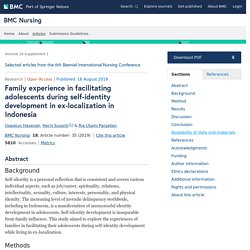
These changes included physical, appearance, and behavioral changes, the ability to build relationships with members of the opposite sex, and the ability to choose activities based on their own interests. Brownlee [14] states that development in early adolescence is characterized by rapid physical changes including height, maturity of reproductive organs, secondary sex characteristics, increased muscle strength, and weight [15, 16].
2007 LuyckxSoenensVansteenkisteGoossensBerzonksy JFP. Six Ways to Build Your Teen's Identity - Focus on the Family. Marriages and families are in trouble after the challenges of last year.

If it's not too much to ask, would you help equip these families with the resources they need to put Jesus at the center of their home? Yes, I will help struggling families! Español. Pearltrees References.